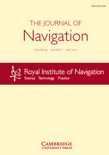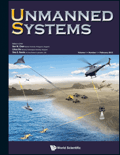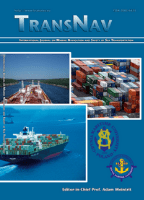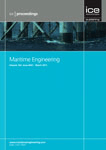
JOURNAL OF NAVIGATION
Scope & Guideline
Elevating Maritime Practices through Rigorous Research
Introduction
Aims and Scopes
- Innovative Navigation Technologies:
Focuses on the development and application of new technologies in navigation, such as GNSS, INS, and hybrid systems, to improve accuracy and reliability. - Maritime Safety and Risk Management:
Explores safety cultures, collision avoidance strategies, and risk assessment methodologies to enhance safety in maritime operations. - Data Analytics and Big Data Applications:
Utilizes data-driven approaches, including AIS data analysis and machine learning techniques, to enhance navigation systems and predict vessel trajectories. - Human Factors and Decision-Making:
Investigates the influence of human behavior on navigation practices, decision-making processes, and the effectiveness of navigational aids. - Environmental and Operational Considerations:
Examines the impact of environmental conditions on navigation and the optimization of navigation strategies in various operational contexts.
Trending and Emerging
- Autonomous and Unmanned Systems:
There is an increasing focus on the navigation of autonomous vessels and drones, driven by advancements in technology and a growing interest in autonomous operations. - Cybersecurity in Navigation Systems:
As navigation systems become more interconnected, research on cybersecurity measures to protect against potential threats has gained significant traction. - Integration of Artificial Intelligence:
The application of AI and machine learning in navigation systems for predictive analytics and decision-making support is an emerging trend. - Environmental Impact and Sustainability:
Research addressing the environmental impact of navigation practices and the development of sustainable navigation solutions is becoming increasingly relevant. - Real-time Data Utilization:
The use of real-time data for enhancing navigation accuracy and safety, particularly through the analysis of AIS and other sensor data, is a growing area of focus.
Declining or Waning
- Traditional Celestial Navigation:
Research related to celestial navigation techniques has decreased as modern technologies like GNSS have become more prevalent and reliable. - Static Navigation Models:
Interest in traditional static models of navigation has waned, with a shift towards dynamic and adaptive models that incorporate real-time data. - Historical Navigation Practices:
Studies focusing on historical navigation methods and practices are appearing less frequently, indicating a move towards more contemporary applications and technologies.
Similar Journals

International Shipbuilding Progress
Catalyzing collaboration in global shipbuilding research.International Shipbuilding Progress is a distinguished journal dedicated to advancing knowledge in the fields of Mechanical and Ocean Engineering, published by IOS PRESS. With a rich history dating back to 1969 and over four decades of scholarly contributions, this journal serves as a vital platform for researchers, professionals, and students seeking to explore innovative technologies and advancements within the shipbuilding sector. Although it currently does not offer open access options, the journal is held in high regard, reflected by its Q3 ranking in both the Mechanical Engineering and Ocean Engineering categories according to the latest 2023 category quartiles. The journal aims to disseminate high-quality research findings and foster collaboration among experts globally, enhancing the maritime and shipbuilding industries. For those engaged in maritime innovation and engineering, International Shipbuilding Progress is an essential resource for staying abreast of the latest developments and research trends.

Journal of Field Robotics
Connecting Theory and Practice in RoboticsJournal of Field Robotics, published by WILEY, is an esteemed peer-reviewed journal focusing on the cutting-edge developments in the area of robotics applied to real-world environments. With an ISSN of 1556-4959 and an E-ISSN of 1556-4967, this journal serves as a vital platform for researchers and professionals keen on advancing the fields of Computer Science Applications and Control and Systems Engineering, where it has earned a prestigious Q1 ranking in both categories as of 2023. The journal, which converges in its studies from 2006 to 2024, showcases original research that enhances the understanding and implementation of robotic systems in various fields, thus promoting innovative solutions to complex challenges. Access to the journal is through subscription-based options, ensuring a rigorous selection of high-quality research articles, reviews, and technical notes that contribute significantly to the academic community. With a solid Scopus ranking—39th out of 817 in Computer Science Applications and 17th out of 321 in Control and Systems Engineering, both in the 95th and 94th percentiles respectively—Journal of Field Robotics is essential reading for anyone interested in the future of robotics technologies and their transformative impact.

Satellite Navigation
Empowering Global Collaboration in Satellite TechnologySatellite Navigation, an esteemed journal published by SpringerNature, serves as a pivotal platform for advancing research in the fields of Aerospace Engineering, Electrical and Electronic Engineering, and Signal Processing. Since becoming an Open Access journal in 2020, it has allowed researchers worldwide to freely disseminate their findings, fostering a collaborative academic environment. With remarkable rankings, including the Q1 designation in three prestigious categories and a top percentile placement in Scopus—#2 in Aerospace Engineering and #4 in Computer Science Signal Processing—this journal is committed to publishing high-quality research that drives innovation in satellite navigation technology. As we move forward into the converged years of 2020 to 2024, Satellite Navigation aims to bridge theoretical and practical knowledge, making significant contributions to this vital area of study. Researchers, professionals, and students will find a wealth of valuable insights and advances, solidifying the journal’s status as a cornerstone in the navigation research community.

Unmanned Systems
Exploring Innovations in Unmanned Vehicle ResearchUnmanned Systems is a leading academic journal published by WORLD SCIENTIFIC PUBL CO PTE LTD based in Singapore, that serves as a premier platform for research and advancements in unmanned vehicle technology. Covering a broad range of disciplines, the journal ranks in the Q1 category for Aerospace Engineering, Automotive Engineering, Control and Optimization, and Control and Systems Engineering as of 2023, showcasing its high impact within these fields. With impressive Scopus rankings placing it in the top tiers of its categories—8th in Control and Optimization and 14th in Aerospace Engineering—Unmanned Systems stands out as a vital resource for researchers, professionals, and students eager to explore current trends and innovations. While the journal operates under a traditional access model, it remains committed to disseminating quality original research, reviews, and case studies that contribute significantly to the understanding and application of unmanned technologies from 2013 through 2024.

TransNav-International Journal on Marine Navigation and Safety of Sea Transportation
Enhancing Navigation for Safer Seas.TransNav - International Journal on Marine Navigation and Safety of Sea Transportation is a leading scholarly publication that addresses the critical themes of marine navigation and maritime safety. Published by Gdynia Maritime University in Poland, this open-access journal has been a vital resource since its inception in 2007, fostering a global dialogue among researchers, maritime professionals, and students. With an impressive trajectory of convergence from 2019 to 2024, TransNav is recognized for its impact in the realm of Ocean Engineering, Oceanography, and Transportation, holding a notable Q3 ranking in Ocean Engineering and Q4 rankings in both Oceanography and Transportation for 2023. The journal serves as an essential platform for disseminating research findings and advancements that enhance safety protocols and navigation strategies in sea transportation, thus contributing to the sustainability and efficiency of maritime operations worldwide. Researchers can access its wealth of information through various academic databases, ensuring that your work remains on the cutting edge of this vital field.

PROCEEDINGS OF THE INSTITUTION OF CIVIL ENGINEERS-MARITIME ENGINEERING
Charting New Waters in Ocean Engineering Knowledge.PROCEEDINGS OF THE INSTITUTION OF CIVIL ENGINEERS-MARITIME ENGINEERING, published by Emerald Group Publishing Ltd, is a leading journal in the field of Maritime Engineering. With a reputable ISSN of 1741-7597 and an E-ISSN of 1751-7737, this journal has established itself as a cornerstone for researchers, professionals, and students keen to explore the complexities of ocean engineering. Operating primarily from the United Kingdom, it has made significant contributions to the advancement of the maritime industry since its inception, covering research from 2001 to 2024. The journal currently holds a Q3 ranking in Ocean Engineering as classified by Scopus, where it ranks 21st among 105 journals in the category, placing it in the 80th percentile, which highlights its influence and relevance in contemporary marine research. Through a rigorously peer-reviewed process, the journal publishes innovative and high-quality articles that encompass broad aspects of maritime engineering, including design, construction, and sustainability, thus serving as a vital resource for those engaged in this dynamic field. By fostering dialogue among professionals and providing access to cutting-edge research, the PROCEEDINGS OF THE INSTITUTION OF CIVIL ENGINEERS-MARITIME ENGINEERING continues to shape the future of maritime engineering practice and education.

Drones, published by MDPI in Switzerland, is a leading open-access journal dedicated to advancing research in the dynamic field of drone technology and applications. Since its inception in 2017, this journal has quickly established itself as a vital source of scholarly content, boasting a Q1 ranking in Aerospace Engineering and strong placements in Artificial Intelligence, Computer Science Applications, Control and Systems Engineering, and Information Systems. The journal aims to foster discourse and innovation around drone usage across various sectors, including environmental monitoring, logistics, and advanced manufacturing. With an impressive Scopus ranking, including a top 30 position in Aerospace Engineering, Drones continues to draw contributions from a diverse array of researchers, professionals, and students, thereby enriching the academic dialogue surrounding this transformative technology. As an open-access journal, it ensures that research is widely accessible, promoting transparency and collaboration within the international research community.

Journal of Space Safety Engineering
Shaping the future of aerospace safety through rigorous research.The Journal of Space Safety Engineering, published by ELSEVIER, is a pioneering platform dedicated to advancing the field of aerospace safety and engineering. Since its inception in 2014, this journal has catered to researchers and professionals focusing on the crucial intersection of aerospace engineering and safety, risk, reliability, and quality management. With an ISSN of 2468-8975 and E-ISSN of 2468-8967, it has established itself within the academic community, currently holding a Q3 ranking in both Aerospace Engineering and Safety, Risk, Reliability, and Quality categories, according to the 2023 metrics. The journal, which covers converged years up to 2024, is instrumental for those seeking to explore innovative safety solutions in space missions and exploration, making it an essential resource for students, industry professionals, and researchers alike. Although it is not open access, it remains a credible source of impactful studies that contribute to enhancing safety protocols and engineering practices in aerospace endeavors. With a strong focus on rigorously vetted research, the Journal of Space Safety Engineering ensures that important advancements in this dynamic and vital field are shared widely among experts and stakeholders.

Brodogradnja
Advancing Marine Engineering through Open Access InnovationBrodogradnja is a distinguished open-access journal dedicated to the fields of Mechanical Engineering and Naval Architecture, published by the University of Zagreb's Faculty of Mechanical Engineering & Naval Architecture. Since its launch, the journal has been at the forefront of disseminating valuable research and advancements in engineering design, marine technology, and shipbuilding practices, contributing significantly to both academic literature and industrial applications. With an impressive Q1 ranking in Mechanical Engineering and a Q2 ranking in Ocean Engineering for 2023, it stands as a pivotal resource for researchers, professionals, and students alike. Moreover, the journal's commitment to open access since 2005 ensures that cutting-edge research is accessible to a global audience, facilitating collaboration and knowledge-sharing among experts in the field. Based in Croatia, Brodogradnja continues to uphold the legacy of high-quality technical scholarship and innovation, making it an essential platform for advancing marine engineering and related disciplines.

Proceedings of the Institution of Mechanical Engineers Part O-Journal of Risk and Reliability
Championing Excellence in Safety, Risk, and Reliability Studies.Proceedings of the Institution of Mechanical Engineers Part O – Journal of Risk and Reliability is a highly regarded journal published by SAGE Publications Ltd, specializing in the critical fields of Safety, Risk, Reliability, and Quality. Established in 2006 and extending its coverage until 2024, this journal serves as a vital platform for researchers and professionals to disseminate innovative findings and discuss emerging trends and methodologies related to risk assessment and reliability engineering. With an impact factor that places it in the Q2 quartile of its category and ranked 69th out of 207 in Scopus, it has garnered significant attention within the academic community, ensuring robust visibility and influence. Readers can expect rigorous peer-reviewed articles that contribute to advancing knowledge and practices in the field, fostering a deeper understanding of the complexities and integral practices essential for safety and reliability. As a leading publication within the United Kingdom, it continues to play an instrumental role in shaping contemporary discussions and research in this vital sector.